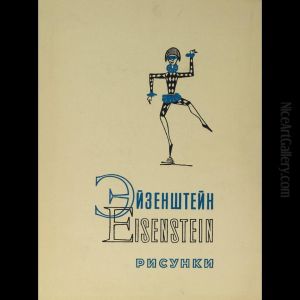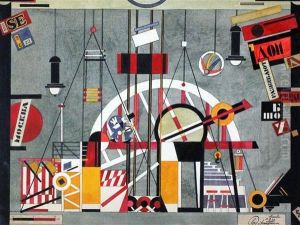Sergei Eisenstein Paintings
Sergei Mikhailovich Eisenstein was a pioneering Soviet Russian film director and film theorist, often considered one of the most influential filmmakers in the history of cinema. Born on January 22, 1898, in Riga, which was then part of the Russian Empire (now Latvia), Eisenstein grew up in a middle-class family. His father, Mikhail Osipovich Eisenstein, was a famous architect, while his mother, Julia Ivanovna Konetskaya, was the daughter of a prosperous merchant. Eisenstein's early exposure to the arts would greatly influence his eclectic style and interests.
Eisenstein initially studied architecture and engineering at the Petrograd Institute of Civil Engineering, but his interest in the arts led him to leave school and join the Red Army to serve in the Bolshevik Revolution. During this time, he became involved in theater and started working as a set designer in Vsevolod Meyerhold's theater. Meyerhold's biomechanics and theatrical production techniques had a profound impact on Eisenstein's approach to visual composition and storytelling.
In the 1920s, Eisenstein began his career in filmmaking with his first feature film, 'Strike' (1925), followed by the critically acclaimed 'Battleship Potemkin' (1925), which is frequently cited as one of the greatest films of all time. His use of montage, a form of editing that juxtaposes images to create new meanings and emotional responses, became a hallmark of his work and an influential concept in the language of cinema.
Eisenstein's later works included 'October: Ten Days That Shook the World' (1928), which commemorated the October Revolution, and 'The General Line' (1929). However, his experimental style and complex narrative structures often brought him into conflict with Soviet authorities who preferred more straightforward, propagandistic content. This tension led to the abandonment of several of his projects and a brief period of time working abroad in Mexico on the unfinished film '¡Que viva México!' (1930-1932).
Returning to the Soviet Union in the 1930s, Eisenstein directed 'Alexander Nevsky' (1938), a historical drama that served as a patriotic call to arms against the threat of Nazi Germany and won him the Order of Lenin. During World War II, he also directed 'Ivan the Terrible' (1944, 1958), a two-part epic that was partially released during his lifetime. The second part faced heavy censorship and was not released until after Stalin's death.
Eisenstein's impact on film theory is equally significant. His writings, including 'The Film Sense' (1942) and 'Film Form' (1949), elaborate on his theories of montage and are still studied by filmmakers and scholars. He also taught at the State Institute of Cinematography (VGIK), influencing a generation of filmmakers.
Eisenstein's health deteriorated in the late 1940s, and he suffered from heart problems. He died of a heart attack on February 11, 1948, in Moscow, Soviet Union, leaving behind a legacy that would resonate throughout the history of film. His work remains an essential reference point for scholars and filmmakers, and his innovative techniques continue to inspire and challenge the norms of cinematic storytelling.



